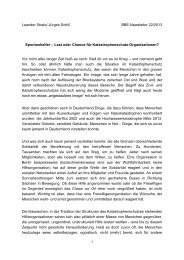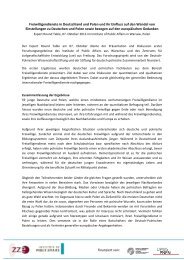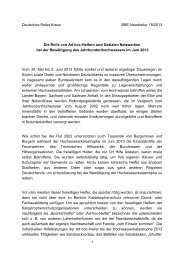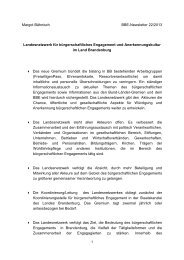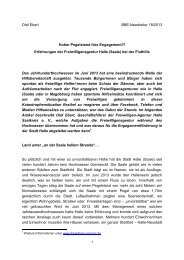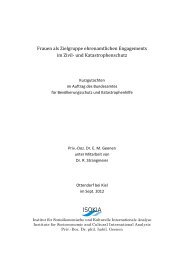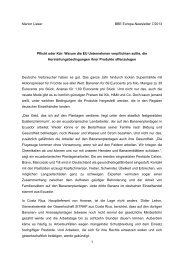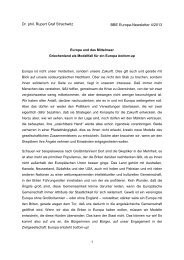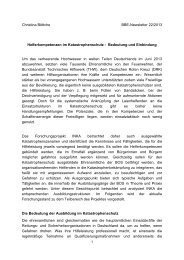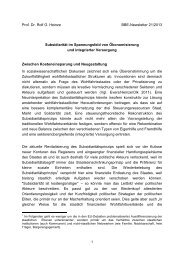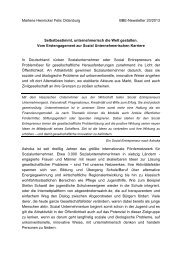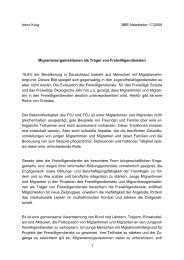ENGAGEMENT UND ERWERBSARBEIT IN EUROPA - BBE
ENGAGEMENT UND ERWERBSARBEIT IN EUROPA - BBE
ENGAGEMENT UND ERWERBSARBEIT IN EUROPA - BBE
Erfolgreiche ePaper selbst erstellen
Machen Sie aus Ihren PDF Publikationen ein blätterbares Flipbook mit unserer einzigartigen Google optimierten e-Paper Software.
forum 1 | roth: activating labour market policy and volunteering<br />
motivation levels as well as to the requirements<br />
of companies and their employees,<br />
• the lack of consideration of the participatory potential<br />
of socially excluded or marginalised groups.<br />
This criticism was aimed primarily at strengthening<br />
the bond and exchange between the labour market<br />
and volunteering, and thereby making better use of<br />
the potential for labour market integration, as well<br />
as promoting volunteering. At the moment however<br />
it looks as if this connection will be undermined and<br />
completely severed over the next few years.<br />
Since 2011 the new Rutte Government has made<br />
changes in direction. The present regulations and<br />
laws will be changed from 2013 and will then increasingly<br />
focus on direct entry into the labour market.<br />
At the same time, strict austerity measures have<br />
been announced, so that from 2012 many municipalities<br />
will cut their budgets in the area of social activation.<br />
The municipalities are largely responsible for<br />
the activation programmes and projects.<br />
These developments may have an adverse effect on<br />
involved unemployed people, non-profit organisations,<br />
local authorities and also employers. On the<br />
other hand, so called “social enterprises”, an innovative<br />
model of social enterprises with relatively low<br />
dependence on government financing, are gradually<br />
beginning to fill the resulting gap.<br />
Prof. Dr. Roland Roth<br />
actiVating labOur Market pOlicy<br />
and VOlunteering<br />
The starting point is a paradigm shift in labour market<br />
and social policy from welfare to workfare, which has<br />
taken place over the past two decades in different versions<br />
and to different extents in many OECD countries.<br />
Its logic runs: Away from social security as status protection<br />
(passive services) to mandatory and sanctionable<br />
forms of activation for the labour market. Groups<br />
far outside the labour market are to be brought back<br />
into the labour market, or included for the first time,<br />
by means of a work-first policy (employment rather<br />
than benefits). In the USA for example, the first target<br />
group was the “welfare mothers”. Destandardised,<br />
deregulated and precarious employment (temporary<br />
work, part-time work, mini-jobs etc.) will be encouraged<br />
in order to create the corresponding demand. In<br />
50<br />
some countries, further concepts of social activation<br />
have also been drawn up in the form of training programmes.<br />
It remains disputable whether workfare has<br />
succeeded in reintegrating such groups back into the<br />
labour market. What is indisputable however is that<br />
there has been a considerable increase in gainful employment,<br />
although to a large extent in precarious employment<br />
and in the low-wage sector.<br />
1. the prOfile Of actiVating labOur<br />
Market pOlicy in gerMany<br />
Germany is a late-comer in matters of activating labour<br />
market policy. Central reforms (in particular the<br />
amendments to SGB II, III and XII referred to as Hartz<br />
IV) only came into force in 2005 (most importantly),<br />
although they were far more extensive than in other<br />
countries, which usually focused their workfare programmes<br />
selectively on certain “problem groups”.<br />
The reduction in registered unemployment since 2006<br />
and the comparatively strong resistance of the labour<br />
market to crises is attributed to by government to this<br />
activating labour market policy. Another view sees in<br />
this development primarily economic effects and the<br />
impact of the special economic competitiveness of the<br />
German economy. One indisputable result is the enormous<br />
expansion of the low-wage sector in Germany,<br />
which is the largest in the EU, with a variety of precarious<br />
forms of employment, such as the large number<br />
of “topper-uppers” on supplementary benefits, who<br />
need such benefits to secure their livelihood. At the beginning<br />
of the last decade, the absence of such a sector<br />
was still seen as a major factor in the high level of longterm<br />
unemployment in Germany. Today, the “flexiblised”<br />
labour market of Germany is regarded as a model<br />
by conservative and liberal governments in the EU,<br />
while from the classical social democratic perspective<br />
there are increasing calls for collateral security (“flexicurity”).<br />
The overall increased employment rate observed<br />
and the structure of the low-wage sector have<br />
a definite social profile: predominantly female, and with<br />
a larger proportion of immigrants, with the younger and<br />
older more strongly represented than the middle-aged.<br />
Contrary to the official slogan of “support and demand”,<br />
the rise of activating strategies was paradoxically<br />
accompanied in Germany by a more or less<br />
drastic dismantling of active labour market policy<br />
(qualification, further training, retraining etc.) – i.e.<br />
plenty of demand, or compulsion, but little support.<br />
Not least for this reason, the ongoing employment<br />
debate confirms the lack of skilled labour. Activating



